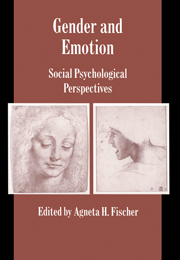Book contents
- Frontmatter
- Contents
- Preface
- Contributors
- Part I Culture, gender, and emotional beliefs
- Part II Emotion expression and communication
- 5 Gender differences in nonverbal communication of emotion
- 6 Gender and smiling: A meta-analysis
- 7 Sex differences in crying: Empirical findings and possible explanations
- 8 Masculine identity and restrictive emotionality
- Part III Distinct emotions
- Part IV Epilogue
- Indexes
- Studies in Emotion and Social Interaction
8 - Masculine identity and restrictive emotionality
Published online by Cambridge University Press: 20 January 2010
- Frontmatter
- Contents
- Preface
- Contributors
- Part I Culture, gender, and emotional beliefs
- Part II Emotion expression and communication
- 5 Gender differences in nonverbal communication of emotion
- 6 Gender and smiling: A meta-analysis
- 7 Sex differences in crying: Empirical findings and possible explanations
- 8 Masculine identity and restrictive emotionality
- Part III Distinct emotions
- Part IV Epilogue
- Indexes
- Studies in Emotion and Social Interaction
Summary
Men and psychology have a somewhat awkward relationship. From its earliest days in the last quarter of the nineteenth century until its mature age in the 1960s, psychology was largely concerned with studying one half of humankind: men. The people who provided the data by participating in psychological experiments were mostly of the male sex, and so was the majority of psychologists reporting about these experiments. As a matter of consequence, a male bias could be discerned in the theories that were advocated, and the topics that were investigated. But, despite the overrepresentation of men in psychology, men were hardly ever studied as men. They were generally seen as representatives of the human species and treated as if they had no gender (Kimmel & Messner, 1989).
Ironically, it took the feminist criticism of the male bias in psychology before a substantial psychology of men was developed. In the 1970s a number of psychologists pioneered in this new field using bits of psychological knowledge to understand masculinity. Most of them were concerned with consciousness raising in accordance with the political aims of their feminist sisters: emancipation required as many personal and structural changes in the lives of men as in women's lives. In academic research, psychologists undertook empirical analyses of the vicissitudes of the male role. In clinical settings, new therapies were developed that confronted men with their personal behavior under patriarchy.
- Type
- Chapter
- Information
- Gender and EmotionSocial Psychological Perspectives, pp. 166 - 186Publisher: Cambridge University PressPrint publication year: 2000
- 98
- Cited by



